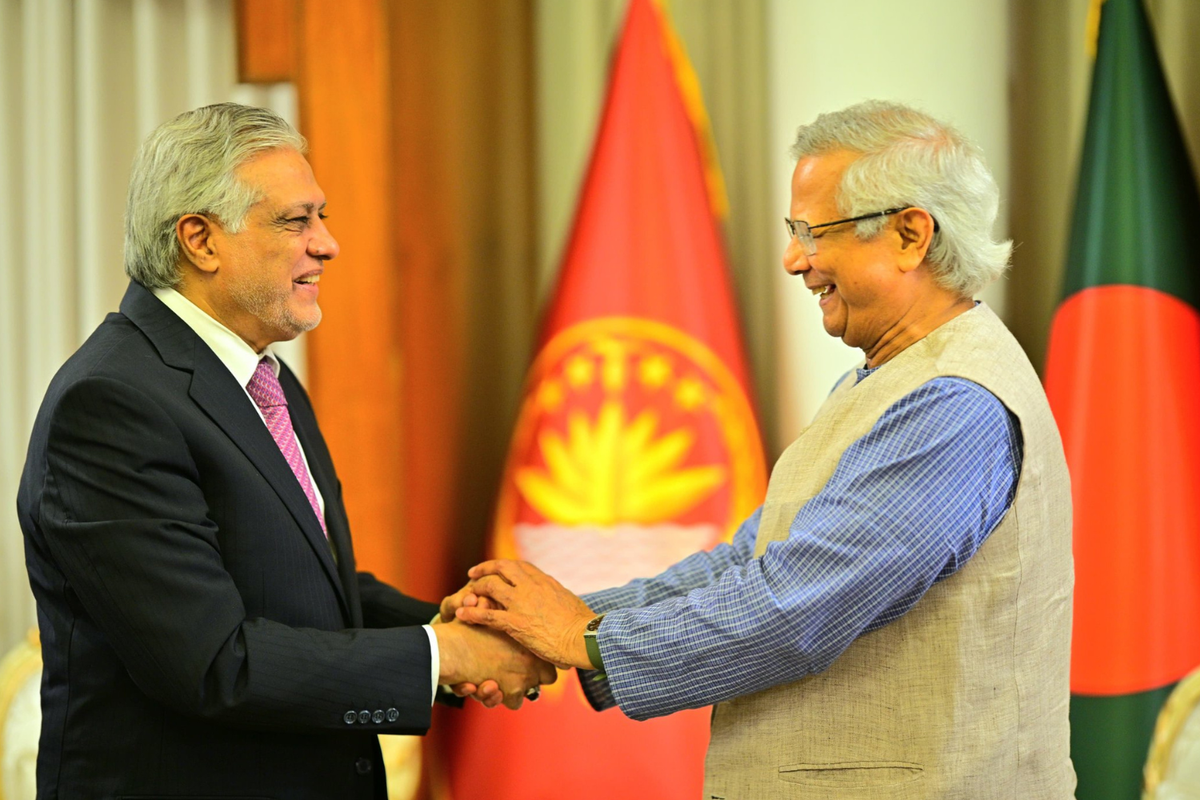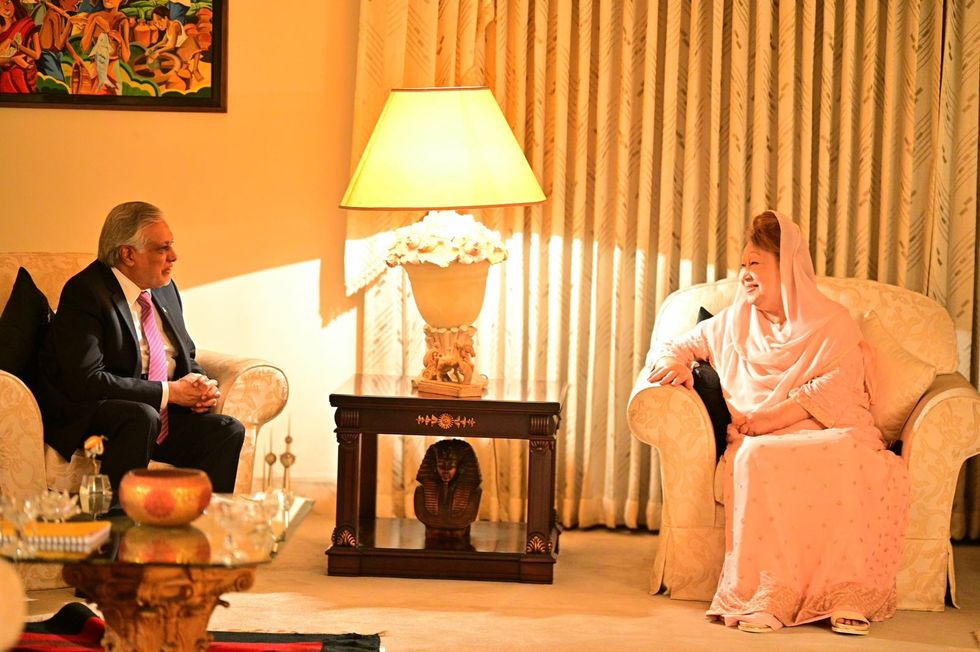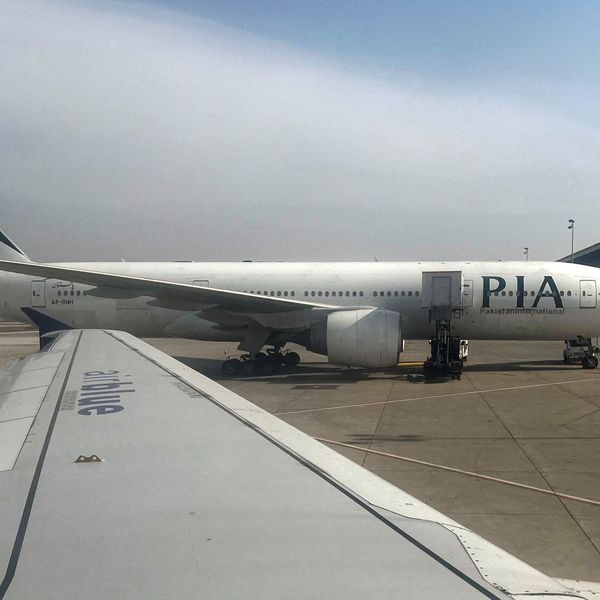Dar in Dhaka: A new chapter or old stalemate?
The visit offers trade openings, but no breakthrough is achieved on apology or asset division

Asma Kundi
Producer, Islamabad
Asma Kundi is a multimedia broadcast journalist with an experience of almost 15 years. Served national and international media industry as reporter, producer and news editor.

Hazrat Shahjalal International Airport witnessed a moment full of diplomatic symbolism as Pakistan’s Deputy Prime Minister and Foreign Minister Mohammad Ishaq Dar arrived in Bangladesh for a two-day visit — the first by a Pakistani foreign minister in 13 years.
The visit came in the aftermath of the collapse of Sheikh Hasina’s government, marking the most significant engagement yet under Bangladesh’s interim administration and raising hopes for a broader reset.During his trip, Dar met with Chief Adviser Muhammad Yunus, Foreign Affairs Adviser Touhid Hossain, BNP Chairperson Khaleda Zia, Jamaat-e-Islami leaders, and other political figures.
Talks centered on strengthening trade ties, expanding economic cooperation, enhancing cultural exchanges, and addressing regional challenges. The visit highlighted opportunities for economic collaboration. Pakistan and Bangladesh signed multiple Memorandums of Understanding covering visa exemptions, agricultural research, quality control, and the Halal Authority.
Deputy Prime Minister and Foreign Minister , Senator Mohammad Ishaq Dar @MIshaqDar50, called on H. E. Professor Muhammad Yunus @ChiefAdviserGoB, Chief Adviser of Bangladesh in Dhaka, today. The discussion covered revival of old connections between the two countries, promoting… pic.twitter.com/2pR6G5q2MO
— Ministry of Foreign Affairs - Pakistan (@ForeignOfficePk) August 24, 2025
Officials said these agreements could help Pakistan access Bangladesh’s rapidly growing economy, with its textile and pharmaceutical sectors particularly poised to benefit.
Dar also pressed for reviving the South Asian Association for Regional Cooperation (SAARC), aligning with Pakistan’s regional strategy. With Bangladesh seeking to reduce dependence on India, the visit offers Pakistan an opening to position itself as a diversified partner.
Historical issues remain unresolved
Despite progress in economic dialogue, no breakthrough was reached on long-standing disputes linked to the 1971 war. Bangladesh reiterated its demands for a formal apology for atrocities committed in 1971, settlement of its share of pre-1971 assets, and repatriation of stranded Biharis.
Foreign Affairs Adviser Touhid Hossain told reporters that Dhaka considers these issues essential for building trust. Dar, however, argued that the matter was settled under the 1974 agreement and urged both sides to “move forward with clean hearts.” Pakistan has expressed regret in the past but has avoided issuing an official apology.
Importance of the visit
For Pakistan, the visit provides relief from isolation in South Asia. Under Sheikh Hasina, Bangladesh maintained a close alliance with India. Now, Pakistan has an opening to explore new trade and economic avenues.
Reviving SAARC could promote regional peace and development while giving Pakistan access to Bangladesh’s 170 million-strong market. Analysts describe this as part of Islamabad’s “forward-looking” diplomacy.

For Bangladesh, the interim government is hedging by moving away from over-reliance on India and seeking closer ties with Pakistan. While this could diversify its economic partnerships in textiles and agriculture, it risks straining relations with New Delhi. Experts view this as part of Dhaka’s “hedging strategy.”
Dar’s visit seen as breakthrough
Former Ambassador Jalil Abbas Jilani told Nukta that Ishaq Dar’s visit to Bangladesh was “highly significant,” not only for strengthening bilateral relations but also for promoting peace, stability, and economic cooperation in the region.
He noted that Pakistan and Bangladesh share “deep bonds of brotherhood” and that a “tremendous amount of goodwill exists between the people of both nations.”
“Unfortunately, under the prolonged undemocratic rule of Sheikh Hasina Wajid, Pakistan-Bangladesh relations deteriorated sharply due to India’s overwhelming influence in almost every sector,” Jilani said.
“Sheikh Hasina owed her electoral victories to massive Indian support, and during her tenure, India managed to eliminate several prominent pro-Pakistan political figures in Bangladesh, including former Foreign Minister Salahuddin Qadir Chaudhry and senior Jamaat-e-Islami leaders who were executed.”
He added that Hasina’s government eventually collapsed after a nationwide uprising, forcing her to flee to India. According to Jilani, Dar’s visit has “reinvigorated Pakistan-Bangladesh cooperation” in trade, commerce, cultural exchanges, education, and professional training.
Trust needed before historic issues settle
Political and defense analyst Hassan Askari told Nukta that the visit raises hopes for better trade relations between Pakistan and Bangladesh, which were highly restricted during Sheikh Hasina’s rule.
He cautioned, however, that resolving historic disputes, such as a formal apology for 1971 and asset division, remains unlikely in the near future because both sides hold divergent positions.
“If anyone expects Pakistan to replace India’s role in Bangladesh, that seems highly unrealistic,” Askari said. Building mutual trust will take time, he added, stressing that economic and political engagement must pave the way for this process.
“Once confidence is established, even the most difficult and longstanding disputes can be addressed,” Askari said, noting that societal linkages may also play a role, though such progress will require considerable time.







Comments
See what people are discussing